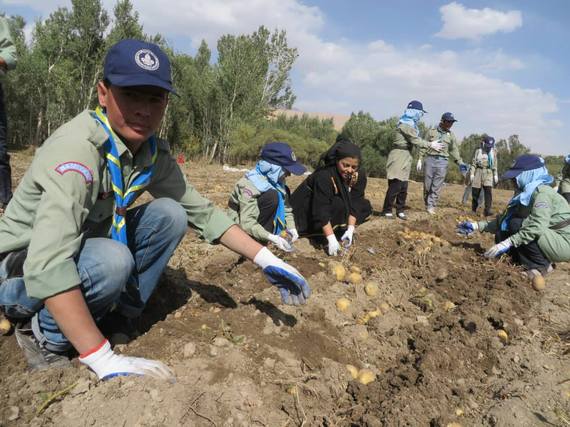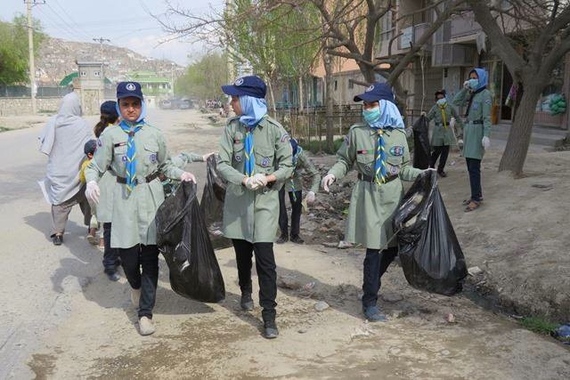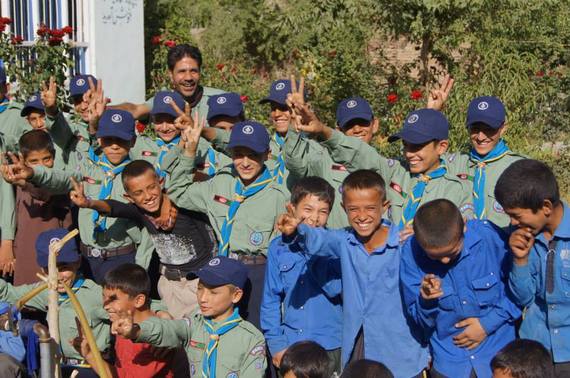I am about to celebrate 10 years since I moved to Afghanistan from Canada. I live in Kabul and I hear about most attacks, political turmoil or general negative drama on Facebook or Twitter when someone posts about how sad it is. Or someone abroad will ask if I'm OK, which means a bomb went off somewhere.
I'm aware of the horrors that the media insists I fixate on, but I'm more absorbed in eye witnessing a whole new generation flourish. Before you roll your eyes at how naive I must be, know that I witness health issues, lack of security and limited education access. I witness the whole list of words that go with a war torn country -- especially poverty. In fact, this flourishing generation I'm referring to is actually a group of over 1,500 very underprivileged Afghan children, mostly orphans. Also known as the Afghan Scouts.
I have the pleasure of producing a children's show with, about and for them. It's a reminder that children are innocent and more hopeful than adults and by that I'm not surprised. But I am genuinely taken aback by what strength they have when given a voice and an opportunity to play a legitimate role in their communities. As we travel the provinces to scope out stories to highlight in our program, I'm in awe. It's that easy? Just give them a platform?
In Bamyan province, a place most famous for its ancient Buddha statues that were destroyed by the Taliban, the multiple scout groups meet weekly. Their civic engagement activity while I was there, was to support a poor family of potato grazers. The family of workers included three children under the age of 10. They pick, sort and pack from dawn to dusk in the hot sun. When they finish and deliver the sacks to the landowner, they are paid with a fraction of the potatoes they picked. They go on to sell these in the market and make a very small earning, barely enough to survive.
On this day, 30 scouts showed up to help them out and increase their earnings. The family was very surprised and I imagine their faith in people supporting one and other was strengthened. I was with the scouts and saw what it did for them as they took part. One little Girl Scout I was picking potatoes with, said that her cousin has to do this work and she had always thought it sounded like fun. But now her back hurt and she was hot. Another scout struck up a conversation with one of the kids from the family of workers. She told him she wished he would be able to go to school one day and told him he was really strong to do this all day. The boy smiled and looked proud. At the end of our short taste of what their daily life was, it was the scouts themselves that told their leaders they wanted to donate their gloves and juice boxes to the working family. It was a beautiful thing to witness.
The Afghan Scouts support their local police, they paint roads, they visit injured soldiers, plant trees and affect people's lives in ways that many would refer to as "aid work". But they're not aid workers. They're future leaders in this country who are choosing to be confident thinkers and doers, rather than just a nationwide collection of disadvantaged children.
What children in places like Afghanistan show us is so different from what we as adults show them. When they are exposed to media they hear about the political shortcomings and violence. When they see themselves, the reflection is refugee camps with sad faces and poverty. There are experts from near and far commenting on "what will happen" and its rarely, if ever, positive and hopeful. Yes, there is truth to the sad and negative things that are still happening here. It makes sense to tell the world and reflect that. But we also have a responsibility to uncover the resilience, possibilities, and strengths -- which are equally true. By doing so, we create a national and international dialogue for the children of this country to find themselves in and develop as they move toward adulthood and responsibility.
A few months ago, I conducted a role-playing exercise with a group of about 40 children aged 6 to 15. They took turns playing the role of "president" at our mock press conference. When the child playing the president was on the podium, the other children had the platform to ask or say what they'd always wanted to the president. So many comments and questions were about war and the presidential election. About the economy and jobs. Their fear of what they heard might happen in Afghanistan. And you could look at that as an indicator for what the future holds for Afghanistan. Pessimism and worry. There is plenty of that. But there was also a little girl named Mariam, who is about 8 years old, who took her turn as the president. One the questions she was asked was:
"Will you create more opportunities for us to study abroad so that we can serve our people?"
Great question I thought. What a patriotic kid. And then Mariam, in her cute squeaky voice, answered without hesitation.
"No. I will make the schools so great in Afghanistan that you never have to go abroad to study"
About 70 percent of Afghanistan's population is under 25. They are vulnerable and impressionable. But they are the majority and they are capable. They show me every day and they will show anyone who asks. There are about 10 times more students in school than a decade ago. They have the potential to do great things. Don't ask the experts, ask them directly. And when you do ask, don't ask them to predict what they think will happen in Afghanistan. As my dear friend and boss says
"That's a question for observers. We're not observers"
We're here. We're investing ourselves in the potential stable future of this country.
I have been here for 10 years. I resist the push the world gives me to think negatively. I accept progress as slow, complicated and anything but easy. But I see it as very possible and even likely. My colleagues and I feel this way not because the world encourages us to move forward with determination, but because 1,500 impoverished orphans do.



